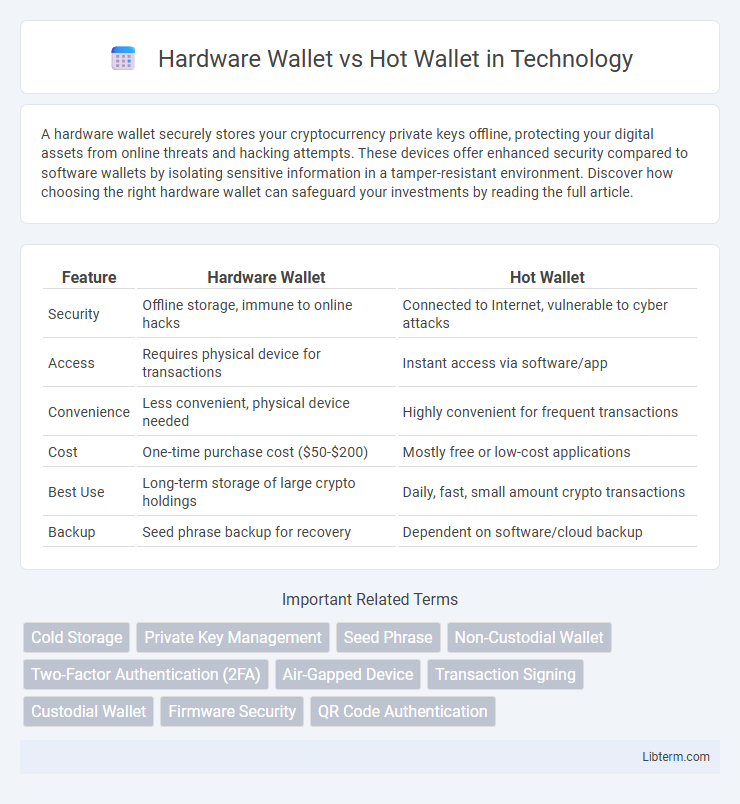A hardware wallet securely stores your cryptocurrency private keys offline, protecting your digital assets from online threats and hacking attempts. These devices offer enhanced security compared to software wallets by isolating sensitive information in a tamper-resistant environment. Discover how choosing the right hardware wallet can safeguard your investments by reading the full article.
Table of Comparison
| Feature | Hardware Wallet | Hot Wallet |
|---|---|---|
| Security | Offline storage, immune to online hacks | Connected to Internet, vulnerable to cyber attacks |
| Access | Requires physical device for transactions | Instant access via software/app |
| Convenience | Less convenient, physical device needed | Highly convenient for frequent transactions |
| Cost | One-time purchase cost ($50-$200) | Mostly free or low-cost applications |
| Best Use | Long-term storage of large crypto holdings | Daily, fast, small amount crypto transactions |
| Backup | Seed phrase backup for recovery | Dependent on software/cloud backup |
Introduction to Cryptocurrency Wallets
Cryptocurrency wallets are essential tools for managing digital assets, with hardware wallets providing offline storage for enhanced security, while hot wallets offer convenient, internet-connected access for frequent transactions. Hardware wallets, such as Ledger and Trezor, store private keys in a secure, physical device, minimizing risks of hacking and malware. In contrast, hot wallets like MetaMask and Trust Wallet enable quick access and usability but require stringent security measures to protect against cyber threats.
What is a Hardware Wallet?
A hardware wallet is a physical device designed to securely store cryptocurrency private keys offline, offering enhanced protection against hacking and malware compared to hot wallets. It isolates private keys from internet-connected devices, preventing unauthorized access during transactions while enabling secure signing of cryptocurrency transfers. Hardware wallets like Ledger and Trezor are favored for cold storage solutions by cryptocurrency investors seeking maximum security and control over their digital assets.
What is a Hot Wallet?
A hot wallet is a type of cryptocurrency wallet connected to the internet, enabling quick and easy access for transactions and trading. It stores private keys online, which increases convenience but also exposes users to higher risks of hacking and cyber attacks. Hot wallets are ideal for small amounts of digital assets used frequently, unlike hardware wallets designed for long-term, secure storage.
Security Features: Hardware Wallets vs Hot Wallets
Hardware wallets provide superior security by storing private keys offline in a tamper-resistant device, protecting against malware and phishing attacks common in software environments. Hot wallets, connected to the internet, offer convenience but are vulnerable to hacking, malware, and unauthorized access due to their online exposure. The isolated nature of hardware wallets minimizes the risk of key theft, making them the preferred choice for long-term cryptocurrency storage.
Ease of Use and Accessibility
Hardware wallets offer enhanced security by storing private keys offline but can be less accessible due to device setup and physical handling requirements. Hot wallets provide greater ease of use with instant access via software applications on smartphones or computers, making them ideal for frequent transactions. Users must weigh the trade-off between security and convenience when choosing the appropriate wallet type.
Cost Comparison
Hardware wallets typically involve a one-time purchase cost ranging from $50 to $200, offering enhanced security through offline storage of private keys. Hot wallets, often free or low-cost, provide convenient access to cryptocurrencies but expose users to higher risks of hacking due to continuous internet connection. The initial investment in hardware wallets translates to long-term savings by minimizing potential losses from cyber threats compared to the virtually cost-free but less secure hot wallets.
Risks and Vulnerabilities
Hardware wallets provide enhanced security by storing private keys offline, significantly reducing the risk of hacking, phishing, and malware attacks common in hot wallets. Hot wallets, connected to the internet, are more vulnerable to cyber threats such as unauthorized access, keylogging, and software exploits. Physical damage or loss of a hardware wallet can lead to asset loss if recovery seeds are not properly secured, while hot wallets may face constant exposure to online vulnerabilities.
Backup and Recovery Options
Hardware wallets provide robust backup and recovery options through encrypted seed phrases stored offline, ensuring secure restoration even if the device is lost or damaged. Hot wallets rely on digital backups such as cloud storage or encrypted files, which can be vulnerable to hacking but offer more convenience for quick access and recovery. Prioritizing secure seed phrase management in hardware wallets minimizes risks of data loss and unauthorized access in cryptocurrency asset recovery.
Best Use Cases for Hardware and Hot Wallets
Hardware wallets provide maximum security by storing private keys offline, making them ideal for long-term storage of large cryptocurrency holdings or assets not frequently accessed. Hot wallets, connected to the internet, enable quick and convenient transactions, suited for daily trading, active portfolio management, or small amounts used regularly. Choosing between the two depends on balancing security needs with ease of access and transaction frequency.
Final Verdict: Which Wallet Suits You?
Hardware wallets provide enhanced security by storing private keys offline, making them ideal for long-term cryptocurrency holders prioritizing asset protection. Hot wallets offer convenience and quick access, suitable for active traders managing frequent transactions. Choosing between them depends on your need for security versus accessibility, with hardware wallets favored for safeguarding digital assets and hot wallets preferred for ease of use.
Hardware Wallet Infographic

 libterm.com
libterm.com